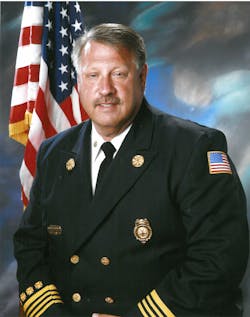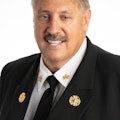If you have been in this profession long enough, you can probably recall at least one call that you will never forget—a call to which you wished you had never been dispatched. For many of us, the call involved children. For others, it involved a call so horrific you have difficulty talking about it. Even if you have been in this profession less than a year, you’ve probably had to tell someone that their loved one has died. In the documentary “BURN,” now-retired FEO Dave Parnell of the Detroit Fire Department said it best: “I wish my head would forget what my eyes have seen.”
All of this is like pouring water into a glass. You might be OK for a while, but if enough water is poured in, it’s going to spill out. For others of us, the glass never fills up and we finish our careers without effect. Some walk off the job never to return. Some find themselves heavily medicated or in professional counseling. But the worse part: Some of our colleagues are so impacted by what they have seen that they decide to take their own life.
Understanding the problem
It seems like we are just starting to realize the impact of all this. Many groups and websites now specifically deal with suicides by firefighters and EMS personnel. The common theme that you read on such sites is that that nobody knew the magnitude of the suicide problem among the people in our profession.
What is the scope of the problem? An Internet search reveals tragic news stories, including those about the Phoenix Fire Department after they had four firefighters commit suicide within a seven-month period. Another news story tells the impact to the Chicago Fire Department who lost 37 firefighters to suicide since they began tracking these events. Another story speaks to the Montgomery County, MD, Fire Department losing 17 firefighters over the last 13 years.
The Firefighter Behavioral Health Alliance (FBHA; ffbha.org) is a nonprofit organization that was created to educate firefighters and EMS personnel about behavioral health issues and mental stressors related to their jobs. It also seeks to track the number of suicides in our industry. FBHA statistics indicate 46 suicides so far this year.
Code Green
The Code Green Campaign (codegreencampaign.org) formed in 2014 and focuses on EMS suicides and mental health. The Code Green Campaign takes its name from the color of the mental health awareness ribbon, and from the “code alerts” that EMS uses to designate an emergency patient. The group’s main mission is to bring awareness of this issue and reduce the high rates of mental health issues and suicides among first responders and EMS personnel. They also want to eliminate any shame or disgrace that people in our profession would feel by admitting they have a problem and need help.
The Code Green Campaign website includes stories from EMS professionals. One in particular tells a heart-wrenching tale of pain and attempted suicide: “Every day is a struggle, yet I keep doing it. I button up my shirt, pants, zip up my boots and prepare for another 12+ hour shift of nothing but pain and suffering. Nobody knows what I see. I’ve went days without sleep. When I do sleep, it’s a nightmare. The infant who drowned in cold water, the man who was struck by a car with his daughter crying over him, the ex-marine with PTSD who got drunk and hung himself in his bedroom. It never stops. People do not know the details of my job, to them it’s just “oh you’re saving lives. Now I’m laying in a hospital bed as I’m writing this. I was in bad shape. My plan was to OD, be electrocuted by the 3rd rail, then struck by the subway. The last thing I remember is taking the pills & heading for the subway, then waking up in the ICU with a tube down my throat. I want to help others find hope but I’m still looking for it myself.”
Care for each other
We’re in the early phases of understanding this. The military is working on the same issue, but they’re still trying to understand it all themselves. PTSD is nothing that you diagnose with an X-ray. As we move toward a better understanding of how multiple serious calls affect us over a career, it does not matter if you are a firefighter, volunteer or EMS-only, we should all be taking care of each other.
About the Author
Gary Ludwig
GARY LUDWIG has served in three fire departments over his career: St. Louis, Memphis, and Champaign, IL. His fire, EMS and rescue career spanned a total of 46 years, and he has been a paramedic for over 44 years. Ludwig served as president of the International Association of Fire Chiefs in 2019-20. He has a Master’s degree in Business and Management, has written over 500 articles for professional fire and EMS publications and is the author of seven books.
Connect with Gary
Email: [email protected]
Facebook: Gary Ludwig
Twitter: @ChiefGaryLudwig
Website: garyludwig.com

